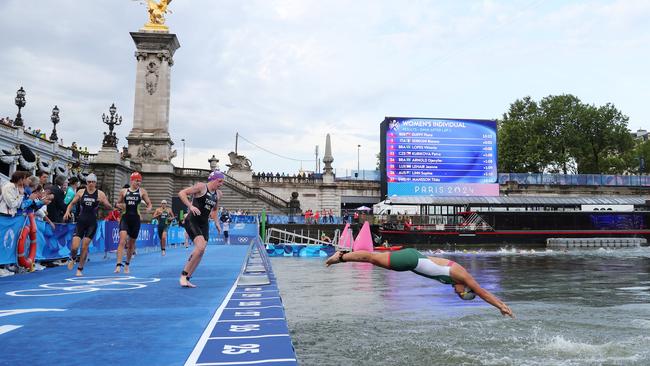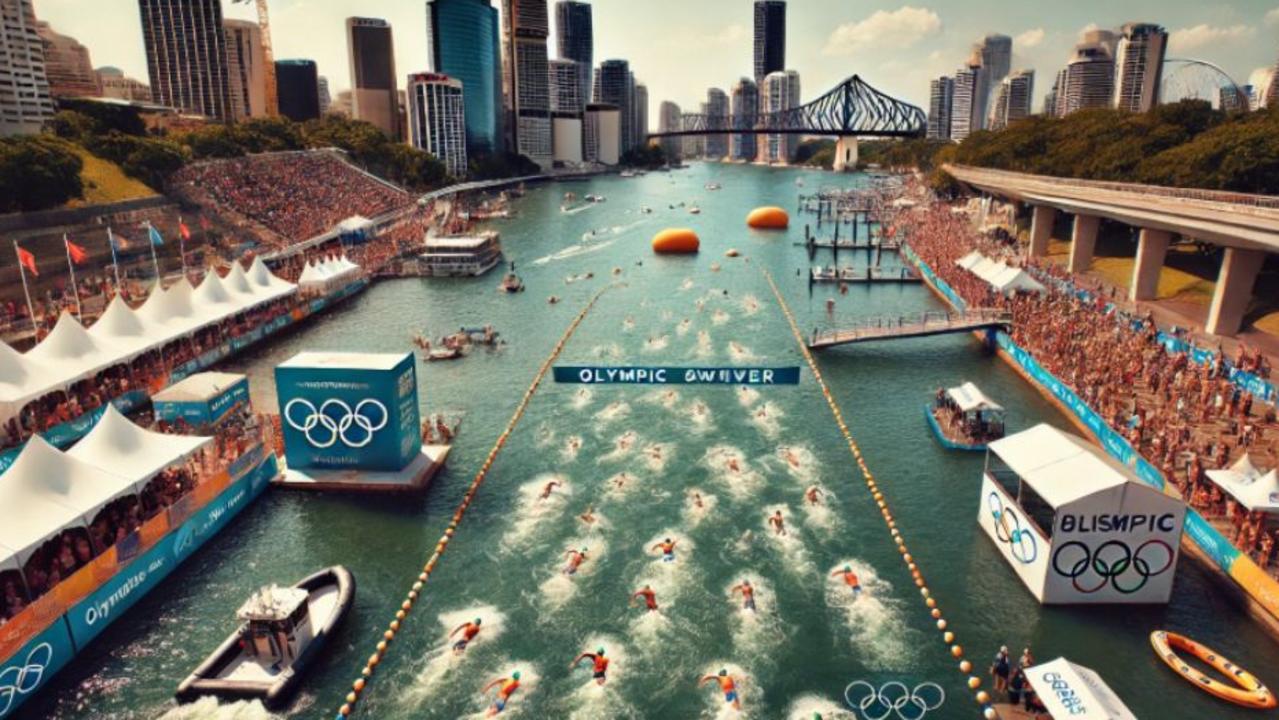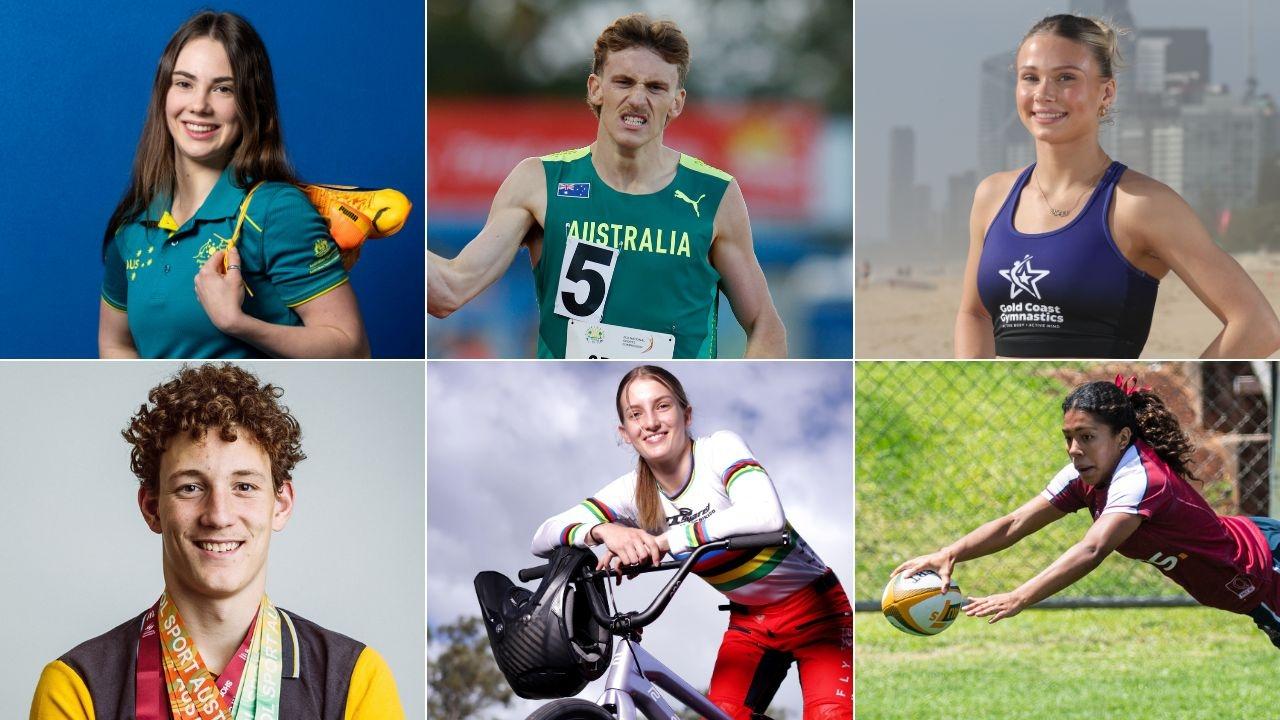Paris Olympics triathlons go ahead on back of 21-hour-old water test
The men’s and women’s triathlon events have been completed but officials are facing tough questions about the legitimacy of water pollution tests used to green light swimming in the Seine.
Triathlon
Don't miss out on the headlines from Triathlon. Followed categories will be added to My News.
Paris 2024 organisers used a 21-hour-old water test to give the green light for triathletes to plunge into the River Seine despite rain in the hours before the event likely causing its quality to deteriorate.
The health of the Seine has been the biggest unknown of the Games with E. coli levels consistently above acceptable levels.
It led to the postponement of the men’s race on Tuesday and heavy rain before the women’s event raised fears both would be turned into a duathlon.
Tensions were high as organisers and Paris officials met in the morning darkness four hours before the women’s race was due to start.
Water analyses found E. coli levels between 488 and 770 colony-forming units and “were deemed compliant by World Triathlon” – allowing the competitions to take place.

However, the test was taken some 21 hours earlier, raising fears overnight rain could have made the condition of the river much worse.
Paris 2024 Director of Sports Aurelie Merle insisted organisers were working with the “most accurate information”.
“Data analysis fluctuates from one day to another so we also have … what’s called a ColiMinder ahead of the competition venue that can give us information on the trend,” she said.
“We also have weather forecast specialists who are also in the meeting who can provide accurate information about how the weather is going to influence the water quality.
“The sample is important, but it is not the only important thing to make the decision.”
Organisers would not commit to releasing the testing results taken the morning of the triathlons.

International Olympic Committee President Thomas Bach made a symbolic visit to the start line of the women’s race and communications director Mark Adams labelled it “simply amazing”.
While athletes trusted organisers’ judgement and raced, Australian Olympic Team medical staff are now closely monitoring four competitors for adverse reactions.
Australian triathlete Natalie van Coevorden, who finished 42nd, wasn’t worried.
“I got drowned about 100 times in that swim and so I probably got about 10 gulps of water but we’ve got the right medical staff to get us on top of it,” she said.
“Swimming in the Seine – well hopefully in the next 24 hours we’ll find out – but it wasn’t actually that bad.”
Leading Australian women’s triathlete Sophie Linn said the water “wasn’t particularly clear” but said the current was more of a problem.
Paris organisers spent $2.5bn making the Seine swimmable for the Olympic Games and will next year lift a century-old ban on entering the river.
TUMBLE OFF BIKE COSTS AUSSIE HAUSER A MEDAL
A tumble at the final changeover cruelly blew Matthew Hauser’s chances of a medal in a chaotic men’s triathlon.
The Australian had put himself in contention after a brilliant opening swim leg but when an opponent cut across him as he was coming into the final transition off the bike, those medal dreams were dashed.
It left Hauser thinking what might have been given the way he stormed home over the final 2km of the run leg to finish seventh behind Great Britain’s Alex Yee.

Yee, the silver medallist from Tokyo three years ago, won the gold medal (1hr43.33sec) following an extraordinary sprint over the final kilometre to overhaul New Zealand’s Hayden Wilde (1:43.39sec) who looked home for all money after setting up a lead of up to 50m at stages during the 10km.
France’s Leo Bergere grabbed the bronze medal (1:43.43sec) with Hauser (1:44.17sec) making up a lot of ground late. Fellow Australian Luke Willian (1:51.13sec) finished 46th.
In his second Olympic Games, Hauser showed his intentions from the start getting a flying start in the 1500m swim leg, charting a different course to the rest of the field and the move worked as he was in third position at the changeover to the bike.
Unfortunately the tumble at the end of the 40km bike saw him slip back to 26th at the final changeover and then when Wilde took off early into the 10km run leg, the field broke up and Hauser seemed to lose contact.

But he dug deep and made up considerable ground in the dying stages to finish seventh which was the third best finish by an Aussie male at the Olympics.
“To finish seventh is better than 24th (at Tokyo Olympics),” Hauser said. “It is always hectic coming into transition particularly with a slower paced bike (leg), everyone really revs it up the last half lap, tensions get a bit high and testosterone kicks in.
“A wheel in front kind of cut across to the left of me and cut my wheel out from beneath me, I fell over then and had to bounce straight back up, pick my bike up and kind of affected me a little bit before the adrenalin got me going again.
“It’s hard to say (if it cost a medal). The guys were flying out there, it affected my momentum a little bit but I probably raced the way I really wanted to race, hard from the start, it was a shame about the bike but I finished strong in the run and that is all I can ask for.
“A top 10 at the Olympics is pretty good. I set my sights high, I really wanted a medal and I knew I was capable of that on my day but it just wasn’t my day.”
Hauser said he was confident the Australian medical team had the right processes in place to avoid any infection from swimming in the Seine which only 24 hours earlier had been deemed unsafe causing the race to be postponed.
“We might shower ourselves in a bit of champagne and get the alcohol to wash ourselves off,” he joked. “As a team we are well prepared, we’ve got antibiotics in our system and virus protection.”
Hauser will be back on Monday to compete in the mixed relay where Australia is considered an outside medal chance.
Originally published as Paris Olympics triathlons go ahead on back of 21-hour-old water test



